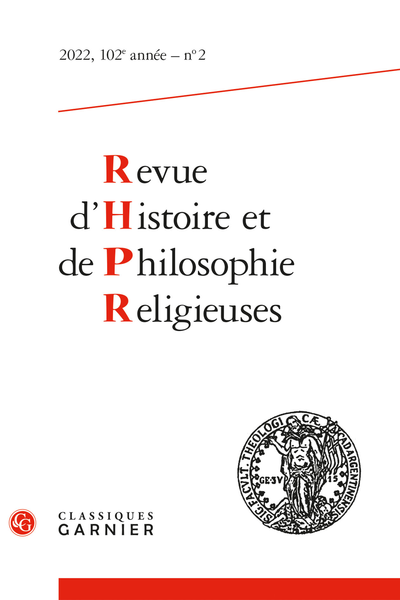
Résumés
- Type de publication : Article de revue
- Revue : Revue d'Histoire et de Philosophie religieuses
2022 – 2, 102e année, n° 2. varia - Pages : 261 à 262
- Revue : Revue d'Histoire et de Philosophie religieuses
- Thème CLIL : 4046 -- RELIGION -- Christianisme -- Théologie
- EAN : 9782406133018
- ISBN : 978-2-406-13301-8
- ISSN : 2269-479X
- DOI : 10.48611/isbn.978-2-406-13301-8.p.0121
- Éditeur : Classiques Garnier
- Mise en ligne : 15/06/2022
- Périodicité : Trimestrielle
- Langues : Français, Anglais
Résumés/Abstracts
Bernard Gosse, « Le Psautier comme prière du David des livres de Samuel selon le Psaume 18 et 2 Samuel 22 »
Une relecture du Psautier comme prière du David des livres de Samuel est perceptible dans les psaumes à titres davidiques qui renvoient aux livres de Samuel, et surtout aux menaces contre David. Dans le Ps 18, la réaffirmation davidique (v. 1) et messianique (v. 51) constitue une réponse à ces titres et à la remise en cause de la perspective messianique (Ps 89). Un parallèle au Ps 18 a été par la suite inséré en 2 S 22, qui fait du guerrier d’Israël l’auteur des cantiques d’Israël.
Mots-clés : Psautier, Samuel, David, prière, guerrier, chantre, rédaction.
Bernard Gosse, “The Psalter as a Prayer of the David of the Books of Samuel according to Psalm 18 and 2 Samuel 22”
A re-reading of the Psalter as a prayer of the David of the books of Samuel is perceptible in the psalms with Davidic titles that refer to the books of Samuel, and especially to the threats against David. In Ps 18, the Davidic (v. 1) and Messianic (v. 51) reaffirmation is a response to these titles and to the challenge to the Messianic perspective (Ps 89). A parallel to Ps 18 was later inserted in 2 Sam 22, making the warrior of Israel the author of Israel ’ s songs.
Keywords: Psalter, Samuel, David, prayer, warrior, cantor, editing.
Christian Grappe, « Les contributions de Max-Alain Chevallier et d’Étienne Trocmé dans la RHPR »
Collègues à la Faculté de Théologie protestante de l’Université de Strasbourg, Max-Alain Chevallier, qui est toujours resté pasteur, et Étienne Trocmé, très engagé dans la cité, ont connu des trajectoires similaires quant aux responsabilités éminentes qu’ils ont été amenés à exercer et dissemblables quant à leur façon de concevoir leur travail d’exégète et de théologien.
Les contributions qu’ils ont publiées dans la RHPR jettent un éclairage sur leur œuvre respective.
262Mots-clés : Nouveau Testament, Faculté de théologie protestante, Université de Strasbourg, Max-Alain Chevallier, Étienne Trocmé, exégèse, théologie, méthode, articles, recensions.
Christian Grappe, “The Contributions of Max-Alain Chevallier and Étienne Trocmé in the RHPR”
Max-Alain Chevallier, who always remained a pastor, and Étienne Trocmé, who was very involved in the city, have followed similar paths in terms of the eminent responsibilities they have been called upon to exercise, but have differed in the way they conceived their work as exegete and theologian. – The contributions they have published in the RHPR shed light on their respective works.
Keywords: New Testament, Faculty of Protestant Theology, University of Strasbourg, Max-Alain Chevallier, Étienne Trocmé, exegesis, theology, method, articles, book reviews.
Christophe Monnot, « Le paradoxe lancinant de l’Église catholique en Suisse »
La nomination, en février 2021, d’un nouvel évêque à Coire ouvre la perspective de la fin d’une longue crise ouverte au sein de l’Église catholique romaine en Suisse (ECR). Les différents rebondissements ont fait apparaître, dans l’espace public, une face uniquement conservatrice de l’ECR. Pourtant, l’innovation déployée pour les restructurations a complètement été passée sous silence. Cet article souligne ainsi un paradoxe lancinant de l’ECR qui, même quand elle innove, apparaît conservatrice.
Mots-clés : Suisse, Église catholique, diocèse de Coire, conservateur, distanciation, sécularisation.
Christophe Monnot, “The Nagging Paradox of the Catholic Church in Switzerland”
The appointment of a new bishop of Chur in February 2021 opened the possibility of the end of a long open crisis in the Roman Catholic Church in Switzerland (RCC). Various developments have made the RCC appear to be exclusively conservative in the public arena. As a result, the innovation involved in diocesan restructuring has been completely ignored. This article highlights a persistent paradox of the RCC, which, even when it innovates, appears conservative.
Keywords: Switzerland, Catholic Church, Diocese of Chur, conservative, distancing, secularisation.